Sanduan:In
the far western reaches of PNG lies the remote province of Sanduan.
Endless jungle and friendly people define the area.
Sounds
like a good combination to me.
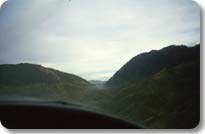 Robert
rolled in around 6:00 a.m. and we drove to the airport.
Walking
right in, there appeared to be less security at a location which gets
international flights than a takeaway shop. We took off and
soon
left behind any signs of civilization. We flew over endless,
sharp ridges covered in jungle with little sign of any human
presence. Occasionally we would see a solitary hut but that
would
be about it. Once I spotted a criss-crossed stack of logs
without
sign of anything else nearby. Robert said that that was a helicopter
landing pad, too isolated to put in an airstrip. He mentioned
that some of the backcountry airstrips were nothing but ridges with the
tops knocked off. They would bring in a small bulldozer by
helicopter, cut down the trees, flatten the ridge top and voila, an
airstrip, albeit one only suitable for very small planes…sort of like
the one we were in.
Robert
rolled in around 6:00 a.m. and we drove to the airport.
Walking
right in, there appeared to be less security at a location which gets
international flights than a takeaway shop. We took off and
soon
left behind any signs of civilization. We flew over endless,
sharp ridges covered in jungle with little sign of any human
presence. Occasionally we would see a solitary hut but that
would
be about it. Once I spotted a criss-crossed stack of logs
without
sign of anything else nearby. Robert said that that was a helicopter
landing pad, too isolated to put in an airstrip. He mentioned
that some of the backcountry airstrips were nothing but ridges with the
tops knocked off. They would bring in a small bulldozer by
helicopter, cut down the trees, flatten the ridge top and voila, an
airstrip, albeit one only suitable for very small planes…sort of like
the one we were in.
Clouds gathered and soon only mountain tops
were visible, looking like lonely islands in the mist. Robert
started to circle and when he finally spotted a hole in the clouds,
landed at Lake Kopiago. Looking for that hole in the clouds
sure
isn’t the procedure with most flights I’ve taken but as long as they
catch sight of the ground, they’ll land. The entire village
came
out when we landed, kids staring at me as though I was an ape in the
zoo. They weren’t quite sure what to make of me.
It’s
pretty obvious they don’t get many visitors but eventually they wanted
to play. When we took off, Robert circled in the valley to
gain
altitude as the nearby mountains were obscured by clouds.
Hitting
a mountain could ruin your whole day. Between Lake Kopiago
and
Telefomin, we didn’t see a single shred of evidence of any humans….kind
of nice, right? We flew between ridgelines above the clouds
and I
have to say, no previous flight ever came close to this one.
He
even let me fly the plane a bit.
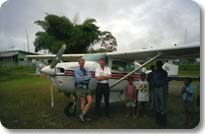 We
landed in Telefomin, a place he described as “out there.”
Sanduan
(or Sundown) province, is the westernmost province in PNG and certainly
among the most remote areas in the country. I said goodbye to
him
and he flew back with a passenger to Mt. Hagen. He’s a great
guy
and a typical Ozzie for sure (that’s not a bad thing either).
I
met a district administrator who was thrilled to see me. He
really wanted to start promoting tourism and the last tourist in the
area was over a year previous. He set me up with a guide,
Bruce,
who would lead me to Oksapmin.
We
landed in Telefomin, a place he described as “out there.”
Sanduan
(or Sundown) province, is the westernmost province in PNG and certainly
among the most remote areas in the country. I said goodbye to
him
and he flew back with a passenger to Mt. Hagen. He’s a great
guy
and a typical Ozzie for sure (that’s not a bad thing either).
I
met a district administrator who was thrilled to see me. He
really wanted to start promoting tourism and the last tourist in the
area was over a year previous. He set me up with a guide,
Bruce,
who would lead me to Oksapmin.
I talked to the MAF (Missionary
Aviation Fellowship) manager and he invited me to lunch with his
wife. We talked of many things but when I mentioned “the gas”
(a
natural gas seep which can be lit on fire) and the caves, they were
impressed by my knowledge. The two guys I met in Lae taught
me
well. I mentioned to them that in the U.S. you can’t
discriminate
by religion for a job, but they didn’t seem to understand
why.
Different places, different ways for sure. I told them that
they
should change their name to “Missionary Air Force” and have a
motto: Our
God can bomb your God into oblivion. They told
me they would think about it.
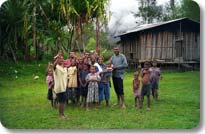 Later
I went to a nearby village, Koremin, to see the Sepik River and the
whole village came out to meet me. Nice folks for
sure. It
must be odd to have so little contact with the rest of the world, so
having an outsider just walk into your village must be a
treat. I
know it was a treat for me. But in some ways, it isn’t that
different than at home. How often do you meet someone from a
far
away land in your average white-bread small town in the U.S.?
Later
I went to a nearby village, Koremin, to see the Sepik River and the
whole village came out to meet me. Nice folks for
sure. It
must be odd to have so little contact with the rest of the world, so
having an outsider just walk into your village must be a
treat. I
know it was a treat for me. But in some ways, it isn’t that
different than at home. How often do you meet someone from a
far
away land in your average white-bread small town in the U.S.?
Bruce
said that he would be there at 6 a.m., needless to say, that didn’t
happen. It’s an isolated part of PNG, but still PNG and
things
usually don’t happen “on schedule.” Eventually we started
walking
and everyone asked where we were going. There are few
tourists in
Telefomin and fewer yet, go deep into the bush. The track
quickly
turned very messy. We had a steep muddy descent to a river, crossed it,
followed by an even steeper, muddy ascent. Then the trail
turned
even muddier and very slippery. It was hard to keep up with
Bruce; first off, he was extremely fit and strong but also he was
tramping in bare feet and in these conditions, that’s an
advantage. Actually, Bruce was as strong as anyone I’ve ever
met
in my life, good heavens, he could just keep going and going.
It
was a difficult hike for me as I wasn’t feeling at the top of my
game. The jungle was lush and wet, and green absolutely
everywhere.
We continued up and down ridges, some of which were
sixty degree slopes, slippery with mud, but that didn’t seem to slow
Bruce down one bit. Now lest you think he is a super tough
guy in
all ways, we did see a poisonous snake. It was about three
meters
away and it didn’t overly concern me, being a safe distance
away.
However, when Bruce saw that snake he ran past me, almost knocking me
over, such was his haste. I understand that Papuans are
generally
terrified of snakes and he certainly was. I’m cautious about
them, having been in Australia, but the mere sight of one doesn’t worry
me.
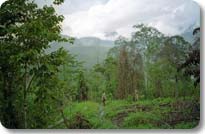 We
climbed a ridge and looked down on a village on the Sepik River. Being
exhausted, I was kind of relieved that the day was over. I
met
some of Bruce’s wontoks (one-talk = friends) and they were surprised to
see me. I was invited into their homes, which were unlike
most of
the houses I had seen. These were made up of small tree
trunks,
five cm. in diameter, driven into the ground. The interior
bamboo
walls were rather nice looking. The first house I
was in
actually had two separate bedrooms and some small luxuries.
Most
of the houses were a single room where the entire family would
live. The owner of the house worked at the Ok Tedi mine and
could
afford a few things his neighbors could not. They asked me
many
questions, served me taro (naturally), and said that they were honored
that I was “the first whiteman in their house.” I told them
the
honor was mine. Whenever I was in such settings, I
would
hear people conversing in their local language and hear the word
“whiteman” in their conversations.
We
climbed a ridge and looked down on a village on the Sepik River. Being
exhausted, I was kind of relieved that the day was over. I
met
some of Bruce’s wontoks (one-talk = friends) and they were surprised to
see me. I was invited into their homes, which were unlike
most of
the houses I had seen. These were made up of small tree
trunks,
five cm. in diameter, driven into the ground. The interior
bamboo
walls were rather nice looking. The first house I
was in
actually had two separate bedrooms and some small luxuries.
Most
of the houses were a single room where the entire family would
live. The owner of the house worked at the Ok Tedi mine and
could
afford a few things his neighbors could not. They asked me
many
questions, served me taro (naturally), and said that they were honored
that I was “the first whiteman in their house.” I told them
the
honor was mine. Whenever I was in such settings, I
would
hear people conversing in their local language and hear the word
“whiteman” in their conversations.
Well, the good times
wouldn’t last as Bruce decided we should make it to another village,
Framin, that day. I was still struggling on the
trail and
not feeling 100%. It was humbling to see a woman
carrying
an immense load of firewood down the slippery trail as if it were a
walk in the park. These people: Made Of
Iron. We
passed through a few more small villages and one could again hear
“whiteman” being bandied about. It wasn’t a bad thing; I was
a
rarity for sure.
We arrived in Framin and soon had a dinner
of….you guessed it: Taro! People were asking me if
I was an
anthropologist as they are the only ones who get there. One
of
the people I met was Enson Derap, the teacher at the local
school. Framin was privileged to have him there.
Some
villages have schools but don’t have teachers to staff them.
You
have to remember how truly isolated Framin is. I talked
extensively with Enson and he was keen to learn all he could (and
vice-versa).
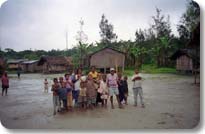 He
mentioned an anthropologist who had been there ten years earlier. He
said he would write, but never did. I explained to him how in
the
west, friendships are often very situational and frequently
disposable. I explained some of the differences in
our
societies and approaches. He was used to sitting around a
fire
every day with his friends, spending hours talking and
socializing. In the western societies, people would say, “I
don’t
have time for that.”
He
mentioned an anthropologist who had been there ten years earlier. He
said he would write, but never did. I explained to him how in
the
west, friendships are often very situational and frequently
disposable. I explained some of the differences in
our
societies and approaches. He was used to sitting around a
fire
every day with his friends, spending hours talking and
socializing. In the western societies, people would say, “I
don’t
have time for that.”
He asked how the west got so rich and I
explained the industrial revolution, large scale production and the
adherence to schedules which that entails. He said, “I can’t
see
the production of automobiles in a rural, village based society where
people come and go as they please. Besides, our country is
only
twenty five years old.” One thing that is striking about such
places is their relationship with time. People don’t say,
“I’ll
see you at 7:30.” Rather they seem to speak of seeing someone
in
the evening and whenever they show up they show up even if you wanted
them to show up at 7:30, they don’t have watches, so it wouldn’t
matter. Their relation with time is very fluid and one could
never say they are slaves to time or schedule. It’s kind of
relaxing to see how things work out as they do.
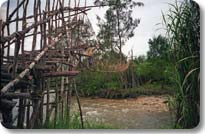 Enson
showed me the foundations of a government built suspension bridge which
had washed away in a flood. The government never fixed the
bridge, so the village got together to build a suspension bridge of
bush materials that worked just fine. It made me realize that
once, we all lived like this in small groups without the specialization
present in industrialized societies.
Enson
showed me the foundations of a government built suspension bridge which
had washed away in a flood. The government never fixed the
bridge, so the village got together to build a suspension bridge of
bush materials that worked just fine. It made me realize that
once, we all lived like this in small groups without the specialization
present in industrialized societies.
It hadn’t been a
great day for me as I wasn’t feeling that good but my stay in Framin
made it a good day. Enson said that I was different from the
few
other visitors they’ve had. He said I was much more open and
nicer than the rest. Now that made my day.
Bruce and I set
out early in the morning. We started climbing steeply through
the
hills covered in gardens. It was quite difficult and
slippery. I still wasn’t feeling that good and the track was
difficult. One person told of landslides ahead and said he
could
guide us for 200 kina, sigh….I know these people think we are rich, but
I wasn’t going to pay him 3-4 months income for a few hours of
guiding. I know that I have an astounding amount of money
compared to them, but my wealth and tolerance have limits. We
continued to walk along the overgrown track. Bruce was flying
up
the hills and I was struggling. Sometimes it was
through
the mud, other times along slippery logs with a 1.5 meter drop on
either side. Bruce noticed I was struggling and said, “I
don’t
know if you’re enjoying the trail and you don’t seem to be feeling
well. We have another 80-90 km. of track like this and from
this
point on, there is absolutely nothing out there until we reach
Oksapmin. Do you think we should turn back?” The
thought
had occurred to me but I don’t like the idea of turning back on a
track, it’s just not something I do, but I told him I would think about
it.
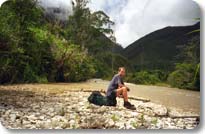 We
walked a little further and I talked to Bruce more about what we were
doing. I was leaning towards quitting but asked for five
minutes
to think about it. I finally made the decision that it would
be
best not to continue. I just wasn’t feeling that great and as
such, wasn’t enjoying the track that much. I felt like a
complete
and absolute failure.
We
walked a little further and I talked to Bruce more about what we were
doing. I was leaning towards quitting but asked for five
minutes
to think about it. I finally made the decision that it would
be
best not to continue. I just wasn’t feeling that great and as
such, wasn’t enjoying the track that much. I felt like a
complete
and absolute failure.
Bruce led us back on a different route,
one that followed the river more and was slightly easier. He
stopped and introduced me to his friends. We talked along the
river and they gave me sugar cane. You strip off the outer
layer
and eat the sweet middle. I started chewing…and chewing…and
chewing. The middle is still pretty woody and there was no
way I
was going to swallow the cane but spitting it out wasn’t an option
either as it would appear that I was ungrateful to his
friends.
So the chewing kept going on…and on…and on, finally his friends noticed
my discomfort and said, “Spit it out!” Whew,
finally! When
I told them what I was doing, they got a big laugh out of it.
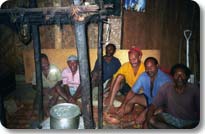 Bruce
and I continued on to Framin and I started to feel more comfortable
with my decision. When we arrived there, we sat around the
fire,
as usual, and talked. Enson later arrived and told me that
while
it was unfortunate that I wasn’t feeling well, he was pleased to see
me. We sat late into the night talking around the
fire. One
person said to me, “I want what you have, how can we achieve
it.” I told them of how western societies had become rich
through
the industrial revolution and how it required people to follow the
clock, among other things. I told him that PNG would have a
very
hard time of doing this due to its isolation and poverty and it would
take several generations of hard work. I said, “And one thing
you
can’t do is sit around the fire for half the day
socializing.” He
nodded his head at the comment about the fire and said, “I like sitting
around the fire. It’s not worth it, I don’t want
it.” While
he was not an educated man, he was an intelligent one.
Bruce
and I continued on to Framin and I started to feel more comfortable
with my decision. When we arrived there, we sat around the
fire,
as usual, and talked. Enson later arrived and told me that
while
it was unfortunate that I wasn’t feeling well, he was pleased to see
me. We sat late into the night talking around the
fire. One
person said to me, “I want what you have, how can we achieve
it.” I told them of how western societies had become rich
through
the industrial revolution and how it required people to follow the
clock, among other things. I told him that PNG would have a
very
hard time of doing this due to its isolation and poverty and it would
take several generations of hard work. I said, “And one thing
you
can’t do is sit around the fire for half the day
socializing.” He
nodded his head at the comment about the fire and said, “I like sitting
around the fire. It’s not worth it, I don’t want
it.” While
he was not an educated man, he was an intelligent one.
Framin is
a typical village in the highlands. Everyone tends a garden
for
their food and their contact with the outside world is
limited.
As such, people make their own fun and socializing is a major
activity. As for the kids, ever present and making themselves
known in the villages, they are rather creative and generally play with
what toys can be made locally. I don’t think I saw single kid
in
the highlands with a plastic toy.
The next morning Bruce and I
said goodbye to Enson and the crowd and continued our way back to
Telefomin. We took a different way back and I was feeling
better
than the previous day, but not well enough to turn back. It
still
bothered me to quit. We arrived in Telefomin and I had a few
days
to kill until a plane arrived.
Telefomin isn’t a big place,
maybe 1500 people, but in this part of PNG, that’s a
metropolis.
There isn’t much there in term of stores or activities. There
is
a small food canteen but the shelves were almost empty, except for
Maggi chicken-flavored two minute noodles of course; those things are
everywhere. The food store had a sign that was unreadable
until
you were a few feet away from it but that really doesn’t
matter.
Everyone knows where everything is and marketing budgets aren’t, and
don’t need to be, a high priority. If there is anything new
in
town, you’ll know it soon enough. My first night back, I felt
like being alone and spent it reading. In my room, there was
a
mouse, several giant cockroaches and a ton of ants, so actually I
wasn’t totally alone.
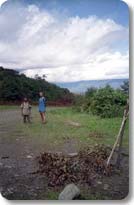 Over
the next days, Bruce and I spent time together. We spent the
time
talking and walking in the nearby hills. He told me he was
going
to miss me and over the last few days, I really enjoyed his
company. We’d walk for a while, then find a spot to
sit and
talk. He told me about when he visits his
girlfriend. It’s
several days of walking at a ferocious pace to the Sepik River, then he
buys a canoe and paddles downstream. He spends time with her,
paddles up stream, sells the canoe, and returns after several more days
of walking. The first plane in Telefomin was going to
Tabubil. How I would get out of Tabubil was yet to be
determined
but I took the plane anyway. Bruce saw me off and I still
think
fondly of our time together.
Over
the next days, Bruce and I spent time together. We spent the
time
talking and walking in the nearby hills. He told me he was
going
to miss me and over the last few days, I really enjoyed his
company. We’d walk for a while, then find a spot to
sit and
talk. He told me about when he visits his
girlfriend. It’s
several days of walking at a ferocious pace to the Sepik River, then he
buys a canoe and paddles downstream. He spends time with her,
paddles up stream, sells the canoe, and returns after several more days
of walking. The first plane in Telefomin was going to
Tabubil. How I would get out of Tabubil was yet to be
determined
but I took the plane anyway. Bruce saw me off and I still
think
fondly of our time together.
I spent a frustrating day in
Tabubil trying to arrange a flight to Wewak, from where I would go on a
boat trip up the Sepik River. Tabubil is a mining town near
the
Ok Tedi mine, PNG’s largest source of foreign
income. It’s
also where Bruce works part time. It’s not a pretty town in
the
slightest. This day PNG at its most frustrating without a
doubt
and it was a hassle trying to make arrangements. However, a
cargo
plane that was delivering vegetables to the mine had just come into
town and was flying back to Wewak. If I was willing to fly in
a
cargo plane without proper seats, than to Wewak we would go.
Not
a problem at all.
My time in the highlands would, for the most
part, be coming to an end. It was a wild time, experiencing
things I never imagined. The only downside was not completing
the
hike a few days ago, but that is the way things go sometimes.
One
of the best times happened on the last day in Telefomin.
Bruce
and I walked into the hills and looked down on the valley. He
motioned to it and told me that this land was his home, not Telefomin,
but the land itself. At that moment, I sensed in him, an
unmistakable pride.
 Robert
rolled in around 6:00 a.m. and we drove to the airport.
Walking
right in, there appeared to be less security at a location which gets
international flights than a takeaway shop. We took off and
soon
left behind any signs of civilization. We flew over endless,
sharp ridges covered in jungle with little sign of any human
presence. Occasionally we would see a solitary hut but that
would
be about it. Once I spotted a criss-crossed stack of logs
without
sign of anything else nearby. Robert said that that was a helicopter
landing pad, too isolated to put in an airstrip. He mentioned
that some of the backcountry airstrips were nothing but ridges with the
tops knocked off. They would bring in a small bulldozer by
helicopter, cut down the trees, flatten the ridge top and voila, an
airstrip, albeit one only suitable for very small planes…sort of like
the one we were in.
Robert
rolled in around 6:00 a.m. and we drove to the airport.
Walking
right in, there appeared to be less security at a location which gets
international flights than a takeaway shop. We took off and
soon
left behind any signs of civilization. We flew over endless,
sharp ridges covered in jungle with little sign of any human
presence. Occasionally we would see a solitary hut but that
would
be about it. Once I spotted a criss-crossed stack of logs
without
sign of anything else nearby. Robert said that that was a helicopter
landing pad, too isolated to put in an airstrip. He mentioned
that some of the backcountry airstrips were nothing but ridges with the
tops knocked off. They would bring in a small bulldozer by
helicopter, cut down the trees, flatten the ridge top and voila, an
airstrip, albeit one only suitable for very small planes…sort of like
the one we were in. We
landed in Telefomin, a place he described as “out there.”
Sanduan
(or Sundown) province, is the westernmost province in PNG and certainly
among the most remote areas in the country. I said goodbye to
him
and he flew back with a passenger to Mt. Hagen. He’s a great
guy
and a typical Ozzie for sure (that’s not a bad thing either).
I
met a district administrator who was thrilled to see me. He
really wanted to start promoting tourism and the last tourist in the
area was over a year previous. He set me up with a guide,
Bruce,
who would lead me to Oksapmin.
We
landed in Telefomin, a place he described as “out there.”
Sanduan
(or Sundown) province, is the westernmost province in PNG and certainly
among the most remote areas in the country. I said goodbye to
him
and he flew back with a passenger to Mt. Hagen. He’s a great
guy
and a typical Ozzie for sure (that’s not a bad thing either).
I
met a district administrator who was thrilled to see me. He
really wanted to start promoting tourism and the last tourist in the
area was over a year previous. He set me up with a guide,
Bruce,
who would lead me to Oksapmin. Later
I went to a nearby village, Koremin, to see the Sepik River and the
whole village came out to meet me. Nice folks for
sure. It
must be odd to have so little contact with the rest of the world, so
having an outsider just walk into your village must be a
treat. I
know it was a treat for me. But in some ways, it isn’t that
different than at home. How often do you meet someone from a
far
away land in your average white-bread small town in the U.S.?
Later
I went to a nearby village, Koremin, to see the Sepik River and the
whole village came out to meet me. Nice folks for
sure. It
must be odd to have so little contact with the rest of the world, so
having an outsider just walk into your village must be a
treat. I
know it was a treat for me. But in some ways, it isn’t that
different than at home. How often do you meet someone from a
far
away land in your average white-bread small town in the U.S.? We
climbed a ridge and looked down on a village on the Sepik River. Being
exhausted, I was kind of relieved that the day was over. I
met
some of Bruce’s wontoks (one-talk = friends) and they were surprised to
see me. I was invited into their homes, which were unlike
most of
the houses I had seen. These were made up of small tree
trunks,
five cm. in diameter, driven into the ground. The interior
bamboo
walls were rather nice looking. The first house I
was in
actually had two separate bedrooms and some small luxuries.
Most
of the houses were a single room where the entire family would
live. The owner of the house worked at the Ok Tedi mine and
could
afford a few things his neighbors could not. They asked me
many
questions, served me taro (naturally), and said that they were honored
that I was “the first whiteman in their house.” I told them
the
honor was mine. Whenever I was in such settings, I
would
hear people conversing in their local language and hear the word
“whiteman” in their conversations.
We
climbed a ridge and looked down on a village on the Sepik River. Being
exhausted, I was kind of relieved that the day was over. I
met
some of Bruce’s wontoks (one-talk = friends) and they were surprised to
see me. I was invited into their homes, which were unlike
most of
the houses I had seen. These were made up of small tree
trunks,
five cm. in diameter, driven into the ground. The interior
bamboo
walls were rather nice looking. The first house I
was in
actually had two separate bedrooms and some small luxuries.
Most
of the houses were a single room where the entire family would
live. The owner of the house worked at the Ok Tedi mine and
could
afford a few things his neighbors could not. They asked me
many
questions, served me taro (naturally), and said that they were honored
that I was “the first whiteman in their house.” I told them
the
honor was mine. Whenever I was in such settings, I
would
hear people conversing in their local language and hear the word
“whiteman” in their conversations.  He
mentioned an anthropologist who had been there ten years earlier. He
said he would write, but never did. I explained to him how in
the
west, friendships are often very situational and frequently
disposable. I explained some of the differences in
our
societies and approaches. He was used to sitting around a
fire
every day with his friends, spending hours talking and
socializing. In the western societies, people would say, “I
don’t
have time for that.”
He
mentioned an anthropologist who had been there ten years earlier. He
said he would write, but never did. I explained to him how in
the
west, friendships are often very situational and frequently
disposable. I explained some of the differences in
our
societies and approaches. He was used to sitting around a
fire
every day with his friends, spending hours talking and
socializing. In the western societies, people would say, “I
don’t
have time for that.” Enson
showed me the foundations of a government built suspension bridge which
had washed away in a flood. The government never fixed the
bridge, so the village got together to build a suspension bridge of
bush materials that worked just fine. It made me realize that
once, we all lived like this in small groups without the specialization
present in industrialized societies.
Enson
showed me the foundations of a government built suspension bridge which
had washed away in a flood. The government never fixed the
bridge, so the village got together to build a suspension bridge of
bush materials that worked just fine. It made me realize that
once, we all lived like this in small groups without the specialization
present in industrialized societies.  We
walked a little further and I talked to Bruce more about what we were
doing. I was leaning towards quitting but asked for five
minutes
to think about it. I finally made the decision that it would
be
best not to continue. I just wasn’t feeling that great and as
such, wasn’t enjoying the track that much. I felt like a
complete
and absolute failure.
We
walked a little further and I talked to Bruce more about what we were
doing. I was leaning towards quitting but asked for five
minutes
to think about it. I finally made the decision that it would
be
best not to continue. I just wasn’t feeling that great and as
such, wasn’t enjoying the track that much. I felt like a
complete
and absolute failure.  Bruce
and I continued on to Framin and I started to feel more comfortable
with my decision. When we arrived there, we sat around the
fire,
as usual, and talked. Enson later arrived and told me that
while
it was unfortunate that I wasn’t feeling well, he was pleased to see
me. We sat late into the night talking around the
fire. One
person said to me, “I want what you have, how can we achieve
it.” I told them of how western societies had become rich
through
the industrial revolution and how it required people to follow the
clock, among other things. I told him that PNG would have a
very
hard time of doing this due to its isolation and poverty and it would
take several generations of hard work. I said, “And one thing
you
can’t do is sit around the fire for half the day
socializing.” He
nodded his head at the comment about the fire and said, “I like sitting
around the fire. It’s not worth it, I don’t want
it.” While
he was not an educated man, he was an intelligent one.
Bruce
and I continued on to Framin and I started to feel more comfortable
with my decision. When we arrived there, we sat around the
fire,
as usual, and talked. Enson later arrived and told me that
while
it was unfortunate that I wasn’t feeling well, he was pleased to see
me. We sat late into the night talking around the
fire. One
person said to me, “I want what you have, how can we achieve
it.” I told them of how western societies had become rich
through
the industrial revolution and how it required people to follow the
clock, among other things. I told him that PNG would have a
very
hard time of doing this due to its isolation and poverty and it would
take several generations of hard work. I said, “And one thing
you
can’t do is sit around the fire for half the day
socializing.” He
nodded his head at the comment about the fire and said, “I like sitting
around the fire. It’s not worth it, I don’t want
it.” While
he was not an educated man, he was an intelligent one. Over
the next days, Bruce and I spent time together. We spent the
time
talking and walking in the nearby hills. He told me he was
going
to miss me and over the last few days, I really enjoyed his
company. We’d walk for a while, then find a spot to
sit and
talk. He told me about when he visits his
girlfriend. It’s
several days of walking at a ferocious pace to the Sepik River, then he
buys a canoe and paddles downstream. He spends time with her,
paddles up stream, sells the canoe, and returns after several more days
of walking. The first plane in Telefomin was going to
Tabubil. How I would get out of Tabubil was yet to be
determined
but I took the plane anyway. Bruce saw me off and I still
think
fondly of our time together.
Over
the next days, Bruce and I spent time together. We spent the
time
talking and walking in the nearby hills. He told me he was
going
to miss me and over the last few days, I really enjoyed his
company. We’d walk for a while, then find a spot to
sit and
talk. He told me about when he visits his
girlfriend. It’s
several days of walking at a ferocious pace to the Sepik River, then he
buys a canoe and paddles downstream. He spends time with her,
paddles up stream, sells the canoe, and returns after several more days
of walking. The first plane in Telefomin was going to
Tabubil. How I would get out of Tabubil was yet to be
determined
but I took the plane anyway. Bruce saw me off and I still
think
fondly of our time together.